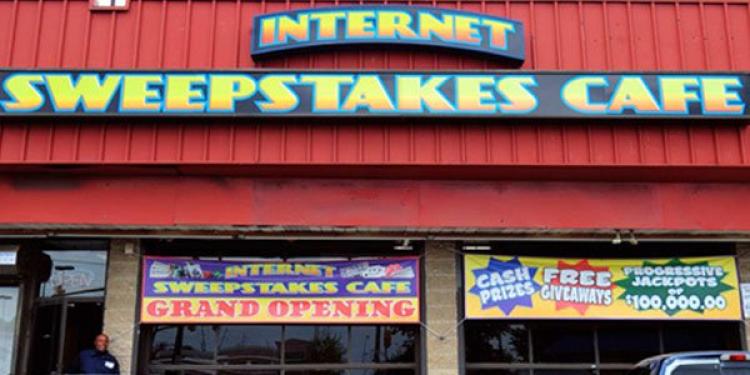Internet Sweepstakes Cafes Continue to Operate in the USA After Being Banned in Some States
Posted: March 25, 2014
Updated: October 4, 2017

Some internet sweepstakes cafes continue to operate in the USA despite being banned in several states.
Internet cafés scattered across gas stations and suburban strip malls in the USA are now offering something more than just coffee and access to the World Wide Web. They are dubbed internet sweepstakes cafes and basically provide a form of online casinos in United States.
There are computers alright, but they look, sound and feel like slot and video poker machines, and sometimes provide real-money wins for the players. The nature of those winnings is still dubious under American gambling laws. There are no clear regulations to govern and tax these businesses.
The view of the authorities
Most of the local and state authorities say these places offer illegal gambling, but shutting them down altogether still poses a problem in most of the states. One important side effect is the $10 billion revenue streaming from these places. Another thing is the comfortable location of cafes, allowing them to be accessed by a large number of casual gamers.
Time is purchased on the machine, along with entries to so-called “sweepstakes”. Players then enter cyberspace to play games looking just like poker and slots in order to see if they’ve won in these sweepstakes.
Gaming industry experts have already opined that this form of gambling is in no way different what McDonald’s offers in their Monopoly game. Buying a sandwich will get you a free entry into a competition, offering real prizes.
The authorities have a different opinion: McDonald’s-style sweepstakes are there for marketing purposes, whereas these Internet café sweepstakes are simply fronts for illegal online gambling.
Some states took action
Florida, Mississippi and Ohio have already passed laws last year, banning these Internet sweepstakes cafes. There are similar law amendments en-route in California and Connecticut. However, operations still go on in those states as well. Attorney General form Ohio, Mike DeWine, commented in American gambling news: “It’s foolish for anybody to think they are not going to come back in a different form. There is so much money involved … tremendous amount of money, hundreds of millions of dollars.”
The states are not getting any tax revenue from these places since they are not properly regulated. Just as an example, the 22 states that do have legal commercial casinos provided almost $9 billion in local and state taxes back in 2012.
In the first year casinos became legal in Ohio – 2012, the state earned $138 million in taxes, Florida earned $162 million in 2012, and Mississippi collected $273 million in the same year from legally operated casinos.
What happened to the bans
Once the states passed the law banning the internet cafes, brand new operations appeared in an effort to circumvent the ban by naming themselves something else, but not internet sweepstakes cafes anymore. In some cases it’s “basic office service” venues, in others “arcade game” parlors.
In Ohio almost 800 internet cafes were shut down, but some of them have already reopened dubbed as “skill game” venues, once again offering real-money payouts in some cases.
DeWine commented: “They are starting to reinvent themselves. They are going to start coming back.”
Governor John Kasich has proposed licensing all “skill game operators” in his new mid-biennium budget review. But legalized gambling is very new to Ohio. And this is how DeWine described the situation: “Ten years ago we didn’t have much gambling in Ohio. We have a ton of it now.”
Other states
North Carolina has also passed a similar legislation banning the internet sweepstakes cafes, and once again some clever businesses “are very good at adapting to whatever law that you write,” said Attorney General Roy Cooper.
Gambling is only legal in North Carolina at the two Indian casinos besides the state lottery. After the ban on internet cafes they have started to come up with clever names as “pre-reveal software” in order to allow people buying time for internet usage or telephone calls, with the same way of rewarding buyers with a prize, which is revealed even before the game is started.
According to the operators these practices do not break the law. But Attorney General Cooper has a different view on the matter. The state authorities have been working hard together with local district attorneys trying to indict some operators, but according to Cooper “they lawyered up pretty well as you can imagine,” and many cases are still pending.
Crackdowns in other states
Florida has over a dozen legal casinos at racetracks as well as Indian casinos. The state banned the cafes last year with federal probe succeeding in shutting down over 50 operations, which were run by Allied Veterans of the World. When Lt. Gov. Jennifer Carroll’s connection to the veterans group during her years in state legislature was questioned by law enforcement, she had to resign.
USA states pursue internet sweepstakes cafes
• Sweepstakes cafes are breaking American gambling laws according to the authorities
• Some states have passed laws to ban these operations
• Clever operators are finding way to reinvent themselves and still function
Local authorities in Mississippi have seized and destroyed 176 electronic video monitors and 10 servers, which were running the internet café games, after a ban was enacted in 2013. State Attorney General, Jim Hood, commented: “Getting rid of the machines is more effective than prosecution.” Casinos are legal in the state since 1990 after the state has allowed riverboat gambling. There are over 30 casinos operating in the state now.
California has wagered war on the sweepstakes cafes ever since they were banned in 2012. But some experts say another law is needed in order to close all the loopholes remaining for these operations to come back. California offers 70 casinos, all of which are operated by Native American tribes.
The only two states without any legal gambling are Utah and Hawaii. Nonetheless there are lots of these internet cafes in Hawaii. The war on them is still waging, with local authorities seizing a big number of gambling machines last year.
Legalizing online gambling in the USA
On the other hand, some US states are looking into ways to make online gambling fully legal. Delaware, New Jersey, and of course Nevada are already offering legal online gambling opportunities to their residents.
The legalization has been made possible following the US Justice Department revision of its 2011 ban on internet gambling sites. Nevada and Delaware even went as far as to sing the first ever inter-state gambling agreement. It will allow poker enthusiasts in both states to go up against each other at online poker rooms.
Off-shore gambling sites and the future of US online gaming
Each year, Americans spend over $3 billion playing at unregulated under American laws off-shore gaming sites. Making online gambling accessible and regulated in the country will certainly bring some of that money home. However, there now competing proposals in Congress both against and in favor of online gambling in the country.
The opponents of gambling say the states will find it difficult to handle $7 billion annual social costs which will stem from gambling addiction treatments, crime, and bankruptcy. Making online gambling legal will only increase this problem according to them. An estimated 9 million Americans have a problem with gambling, according to the National Council on Problem Gambling figures.












